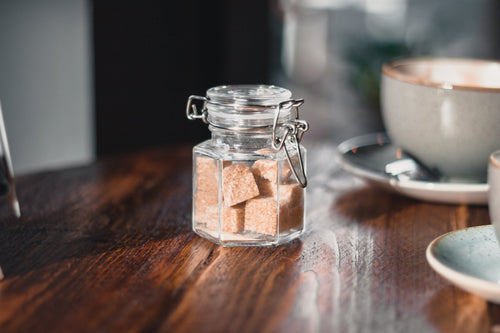For over 3,000 years, turmeric has been used as much more than just as a spice. This incredible compound has also been used in holistic medicine and is reported to have an abundance of health benefits and therapeutic effects.

Now, different turmeric products, including turmeric capsules and tinctures, are widely available, with thousands of people now using it as a staple to support their general well-being.
Like all alternative medicines, though, knowing how to take turmeric can be confusing. Which supplement is best, and more importantly, how much turmeric per day should you be taking?
Are there risks associated with long-term use, or is this spice completely safe to ingest at high doses?
To help ease your confusion, we’ll dive into the science behind turmeric dosing, its benefits, and its risks, so you can begin your journey with confidence.
Curcumin and Turmeric Dosage And Ingestion Methods
First up, a little background on turmeric.
Turmeric’s active ingredients are curcuminoids, which include curcumin. This group of compounds can be found in the root of the plant and is considered to be where all the beneficial properties come from. Take a look at all the research and studies into the power of turmeric.
You’ll find that curcumin, in particular, is the most commonly documented and measured component of curcuminoids. This is because it’s believed to contain powerful antioxidants, anti-inflammatory effects, and antimicrobial properties.
However, it's important to note that the other curcuminoids in turmeric also have their own beneficial effects and properties.

Curcumin And Supplements
Although curcumin is where all the power lies, it isn’t found in abundance. In fact, the average curcumin content found in turmeric powder is only approximately 3%.
This means if you were to rely solely on the spice to get all the health benefits, you probably wouldn’t reach the beneficial levels used in clinical trials. This is why most people choose to take supplements.
However, there’s still a catch. Although supplements contain more milligrams of curcumin than the spice alone, curcumin isn’t absorbed well into the bloodstream.
To improve the bioavailability of curcumin, most people opt for supplements that contain black pepper or its natural compound piperine, which has been proven to increase curcumin absorption by as much as 2.000%.
So, if you’re wondering which method of ingestion is best - curcumin supplements are a clear winner.
However, if you choose to take a supplement, check the levels or grams of curcumin, and make sure you buy from a manufacturer that includes black pepper or piperine, so you can reap the full potential health benefits.
Curcumin and Turmeric Dosage
If you’ve chosen to take a turmeric supplement, you probably still have one nagging question - how much turmeric per day should you be taking?
The truth is, there’s no ‘official’ amount. That’s why we need to use the research surrounding turmeric and curcumin to make an informed decision.
You should also consult your manufacturer's guidelines for the recommended turmeric dosage and talk to a doctor before starting treatment.
First, a word of warning: turmeric can interact with some medications, including blood thinners and medications for diabetes.
So, if you’re thinking to incorporate turmeric into your diet but you’re on either of these medications, talk to a doctor first.
However, turmeric seems to be safe in small doses for these patients, as long as you’re not exceeding the amount of turmeric you’d usually consume in your food.
Most studies use a turmeric dosage between 500 and 2000 mg per day; this also contains a much higher dose of curcumin than is found to occur naturally in food.
While spices contain just 3% of curcumin, most extracts can contain up to 95%. Sticking to a supplement within the 500-2000 mg of turmeric level appears to be safe for consumption, but how do you know which turmeric or curcumin dosage works for you?
Well, although you’re free to experiment with your turmeric dose, some studies into the benefits of turmeric on specific ailments have shown promising results.
We can use this evidence to help us make informed choices about how much curcumin or turmeric to take per day. Let’s look at some examples below for turmeric daily dosage for different benefits:
- Dosage for itchy skin and skin conditions: 500mg 3x a day for 2 months.
- Turmeric dosage for high cholesterol: 700mg 2x a day for 3 months.
- Turmeric dosage for osteo arthritis: 500mg 2x a day for 2-3 months.
- Dosage of turmeric for inflammation: 500mg 3x a day for 2 months.
*Most studies have not treated participants with turmeric for over three months; therefore, it’s unclear whether using high doses will cause adverse effects in the long term.
Although we need more research to determine the long-term effects, for now, the World Health Organization (WHO) states that approximately 1.4mg of turmeric per pound of weight is safe for daily consumption.
Turmeric & Curcumin Side Effects

While turmeric is safe to consume at low, managed doses, some possible side effects have still been reported. The most common adverse effects of turmeric consumption include:
- Nausea
- Vomiting
- Allergic reactions
- Stomach cramps
- Constipation
- Diarrhea
However, studies show that turmeric side effects appear to be rare and only occur in patients taking high doses of turmeric. For short periods, taking up to 8mg of turmeric a day is safe and will not cause any toxic effects on the body.
Turmeric is safe for most people, but some may need to avoid it. If you have any of the conditions below, you may need to take extreme care when taking turmeric or curcumin. Talk to a health care provider first before starting treatment.
- Anemia: Turmeric may interfere with iron absorption, but this has not been proven.
- Diabetes: In some patients, turmeric can also cause blood sugar levels to be dangerously low. You should avoid high doses of turmeric if you have diabetes.
- Gallbladder Disease: If you have gallbladder disease, your symptoms may be exacerbated by turmeric, which can cause the gallbladder to contract.
- Pregnancy: Unfortunately, the effects of turmeric supplements on pregnant and breastfeeding people are unknown.
- Bleeding Disorders: Turmeric may prevent blood from clotting, which can be dangerous for patients with bleeding disorders.
- Kidney Stones: Turmeric extract and supplements are high in oxalate, which can form kidney stones. Take extreme care with products that contain turmeric if you have kidney stones.

The Bottom Line
Choosing the correct dose of turmeric can be tricky, especially because long-term research is so limited. However, preliminary studies are promising, and we can use their results and dosages to help us determine our own.
Remember to consult a healthcare provider before taking turmeric or curcumin supplements, stick to only taking the recommended dosage stated on the manufacturing guidelines, and choose supplements that contain piperine to enhance absorption.














